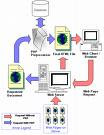PHP stands for Hypertext Preprocessor and is a powerful server-side language that allows you to create dynamic and interactive websites
PHP represents a robust open-source development language that provides the tools and flexibility to accomplish virtually any task. PHP is an embedded language which means developers can jump between raw HTML code and PHP without sacrificing readability. Beyond its basic syntax, PHP also boasts a wide range of interfaces allowing it to communicate with everything from other web pages, to databases including ODBC, and other programming languages such as Java or COM.PHP is a customized, embedded CGI language. Because PHP is server-side technology, the person viewing the web page needs no special programs or browser plug-ins for PHP to work. PHP is compatible with all major web browsers, and although it is classified as a CGI, PHP is a tool that provides much more power. It allows a web developer to dynamically construct a web page based on data gathered from a third source (a database or otherwise) and then communicate that data through almost any means provided by the Internet. The real benefit of this is the developer can do these things with little or no knowledge of the inner workings between the CGI and the database they are communicating with.


The main benefits of PHP are that it is free compared to rival products such as Microsoft ASP.PHP code or scripts are ran on your web server but not in the client browser. You can easily install and configure it to work locally on your windows machine.

No comments:
Post a Comment